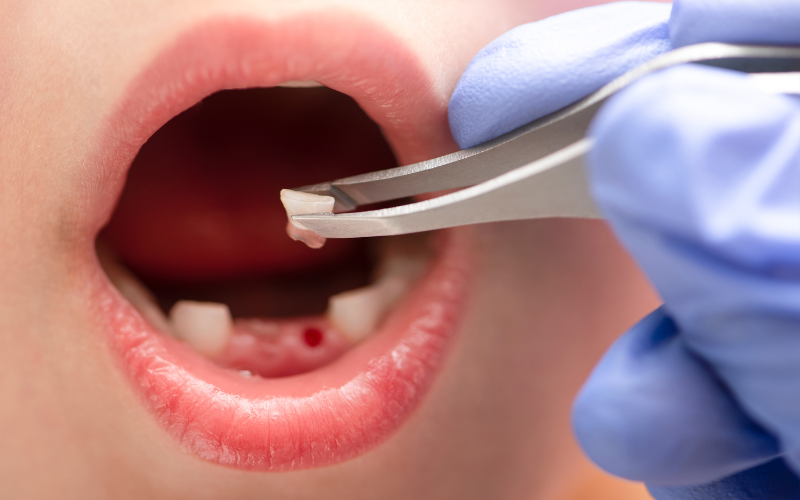While a tooth extraction is a regular dental surgery, it can cause a wave of uneasiness and questions. Understanding the recovery timeframe is critical for a healthy healing process, whether you expect to remove a bothersome tooth or recuperate following the treatment. In this tutorial, we’ll go into the many facets of post-tooth extraction recovery, focusing on common timescales and providing advice to guarantee a faster and more comfortable healing process.
Brief Explanation Of The Tooth Extraction Process:
Tooth extraction is a dental operation that involves local anesthesia, professional instruments, and a gauze pad to remove damaged or troublesome teeth. Impacted teeth may necessitate minimal surgery. Understanding the technique allows patients to face the treatment with confidence and prepares them for the stages of recovery.
The Initial Phase: What To Expect In The First 24 Hours
The first rehabilitation stage begins the moment you leave the dentist’s chair. It is common to suffer some bleeding over the first 24 hours. This can be managed by gently chewing on a gauze pad given by your dentist. Applying an ice pack to the afflicted region at 15-minute intervals will help reduce swelling. Avoid forceful cleaning or touching the surgery site to minimize any disturbance to the developing blood clot, which is vital for healing.
Days 2-3: Managing Discomfort And Swelling
You may notice some bruising and swelling in the second and third days following extraction. It is a common stage of the recovery process. Your dentist can prescribe over-the-counter pain medications to assist ease any discomfort. Sticking to a soft-food diet and avoiding hot beverages during this time will also help healing.
Days 4-7: The Road To Normalcy
By the fourth day, you should feel more at ease, and any residual swelling should have subsided. While you should always be cautious about your diet, adopting slightly harder foods is often safe. However, avoiding behaviors that might disrupt the healing site, such as smoking or rigorous washing, is critical. It is critical to call your dentist as soon as you see any indications of infection or continuous discomfort.
Weeks 2-3: The Healing Progresses
As the second week begins, you should feel a substantial increase in your general comfort and well-being. Most of your post-extraction discomfort and edema should be gone, enabling you to resume your normal activities. However, it is critical to maintain good dental hygiene and follow any extra advice your dentist gives.
Long-Term Considerations: Patience Pays Off
While the early recovery period is critical, it is important to understand that total healing may take several weeks to a few months. Over time, the bone and gum tissue at the extraction site restructure and fill in. Attending follow-up appointments with your dentist during this time is critical to evaluate development and resolve any issues.
Factors Influencing Recovery Time
Understanding the recovery duration from a tooth extraction is crucial, and several factors can significantly influence this timeline.
1. Age and Overall Health
1. Youth vs. Elderly
Younger individuals tend to heal faster due to robust cellular activity and metabolism.
2. Health Conditions
Underlying health issues can slow down the healing process. Conditions such as diabetes or immune system disorders may impact recovery.
B. Type of Extraction (Simple vs. Surgical)
1. Simple Extraction:
Involves the removal of a visible tooth, typically with minimal trauma to surrounding tissues. Recovery is generally quicker.
2. Surgical Extraction:
It involves more complex procedures, such as removing impacted teeth. Recovery time may be longer due to increased tissue disruption.
C. Proper Post-Operative Care
1. Adherence to Instructions:
Following the dentist’s post-operative instructions is crucial for optimal healing.
2. Medication Compliance:
Taking prescribed medications on schedule aids in pain management and reduces the risk of infection.
3. Oral Hygiene Practices:
Proper cleaning of the extraction site without disturbing the healing process is essential.
D. Lifestyle Factors (Smoking, Alcohol Consumption)
1. Smoking:
Tobacco use can significantly impede the healing process by reducing blood flow and increasing the risk of infection.
2. Alcohol Consumption:
Excessive alcohol intake may interfere with the body’s ability to heal. It may potentially adversely interact with prescription drugs.
E. Nutritional Habits
1. Balanced Diet:
A nutritionally rich diet promotes healing. Ensure an adequate intake of vitamins and minerals, especially vitamin C and calcium.
F. Pre-existing Conditions
1. Oral Health:
The condition of the oral tissues before extraction can impact recovery. Healthy gums and surrounding tissues facilitate faster healing.
2. Bone Density:
Adequate bone density contributes to a stable healing environment after extraction.
G. Communication with the Dentist
1. Follow-Up Appointments:
Regular check-ups with the dentist allow for monitoring progress and prompt addressing of any concerns.
2. Open Communication:
Reporting any unexpected symptoms or issues to the dentist ensures timely intervention.
Understanding and addressing these factors play a pivotal role in determining the speed and success of the recovery process after tooth extraction. Always consult with your dentist for personalized advice based on your unique circumstances.
Complications And When To Seek Help
Tooth extractions are usually painless, but it’s important to be aware of potential issues throughout recuperation. Constant bleeding, chronic discomfort, and infection symptoms should be treated. Seek emergency medical treatment if you are having trouble breathing or swallowing. Prompt contact with your dentist is critical for resolving issues and ensuring the procedure’s success.
Recovering from a tooth extraction is a slow process that demands patience and good care. You may encourage a smooth recovery and reduce the risk of issues by recognizing the various stages of healing and following your dentist’s instructions. If you have any worries or notice strange symptoms throughout your recuperation, please get in touch with your dentist immediately. Remember that everyone’s recovery path is different, so pay attention to your body and allow it the time it requires to recover properly.

